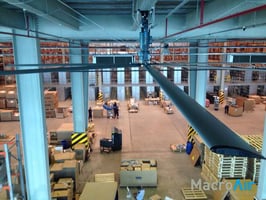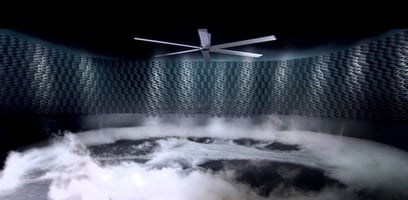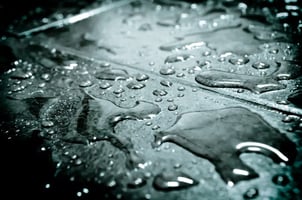Concrete Sweat Is Hazardous | How To Stop Concrete Sweating
What Is Sweating Slab Syndrome and Why Should You Care?
If your facility’s concrete floors are slick with condensation, you're dealing with Sweating Slab Syndrome (SSS). Also known as concrete sweating, SSS results from the clash between air temperature and the cooler temperature of the concrete floor. When the moisture in warm air meets a cooler slab, it condenses - creating a slick, unsafe surface that jeopardizes operations. Many facility managers ask, "Does concrete sweat?" The answer is absolutely yes - and it creates significant problems.
As industrial ventilation experts with over 25 years of experience solving moisture and airflow challenges, MacroAir understands the critical safety and operational impacts of sweating concrete. We make it our business to understand how air can work for your facility, not against it.
Why Concrete Sweating Is a Serious Problem
A sweating concrete slab isn’t just a cosmetic issue. It’s a serious safety hazard. Is concrete sweating bad? Without question. Wet slabs increase the risk of slip-and-fall injuries, one of the top sources of workers’ compensation claims. Slippery surfaces can also cause equipment to shift or slide unexpectedly, putting your staff and your operation at risk of major injuries and damages.
Beyond safety, sweating concrete slabs also contributed to poor air quality. Moisture can breed mold and mildew, compromise stored goods, and trigger respiratory issues. The moisture doesn't just stay on the floor - it seeps into machinery, corrodes surfaces, and damages building infrastructure.
How can you protect your people, products, and productivity? The answer starts with understanding the root cause - and finding an effective, proactive solution. That’s where large ceiling fans, like MacroAir’s HVLS fans come in.
What Makes Concrete Sweat?
Concrete floor condensation occurs when surfaces drop to dew point temperature, and moisture in the air condenses. This is especially common in humid regions or buildings with poor ventilation. Moisture can also be pulled up from the ground below the slab or enter through vents, windows, and doors.
Salt buildup can make things worse. The salt draws moisture from the air and within the concrete itself, pulling even more water to the surface. Understanding what causes concrete to sweat is the first step in developing effective solutions.
How to Identify Moisture Problems Before It Costs You: Measuring Moisture Content and Humidity Levels
If your floor looks dry, that doesn’t mean it’s safe. Watch for:
- Damp spots or discoloration
- Cracks or splits in the slab
- White residue (alkali / salt deposits)
- Musty odors or visible black mold spots
- Excess moisture and high humidity levels in the air
These are all signs of Sweating Slab Syndrome - each one carrying a price tag in damage, downtime, or health.
How to Fix Concrete Sweating: 6 Ways to Reduce Concrete Floor Condensation on Cement Floors
1. Improve Air Circulation to Dry Out Concrete Fast
The fastest and most cost-effective way to dry out your floor? Air movement.
Industry expert Jason Hornsby explains:
“For my clients in the South, sweating slab is a big issue due to the humidity. If they have a high volume low-speed fan, they can come into work, turn it on, and within an hour or less, it’s totally dry. Some people even say that if they know they’re going to be getting those temperature swings that certain time of the year, then they could just leave the fans on all night, and the floors won’t sweat.”
By equalizing temperatures between air and floor, large ceiling fans, like MacroAir’s HVLS (high-volume, low-speed) fans can help regulate fluctuating temperatures while keeping costs down, eliminate condensation, and keep spaces safe and dry.
2. Prevent Moisture with Clean Surfaces and Penetrating Sealers
Clean concrete slabs dry faster and stay drier. Regularly scrub floors with commercial cleaning agents, vacuum your machines, and use concrete sealers. A penetrating sealer or concrete densifier primer followed by a penetrating stain repellent provides maximum protection against staining. A concrete densifier primer followed by a penetrating stain repellent helps lock moisture out and prevent further problems.
3. Re-Examine Your Facility’s Airflow
If moisture gets trapped inside your building, you need airflow to push it out. Large industrial fans, known as HVLS fans, are an ideal and cost-effective way to circulate and destratify air, preventing temperature imbalances and humidity buildup. People also experience massive improvements in air quality with ceiling fans and other tips. Bonus: employees stay cooler and more comfortable, too.
4. Dry Floors with Large Ceiling Fans
MacroAir HVLS fans increase the rate of surface evaporation. They’re an energy-efficient, low-maintenance solution to high-stakes safety issues, eliminating slick spots and regulating building temperatures. These fans work effectively even when cold floors are exposed to temperature fluctuations that typically cause condensation.
5. Consider a Dehumidifier
Industrial dehumidification systems can reduce humidity but come with high operating costs. While air conditioning may seem like a solution, it often compounds the problem by creating colder temperatures on floor surfaces. Large ceiling fans can often provide a more cost-effective, energy-efficient way to manage interior humidity and keep sweating slabs in check.
6. Add Low-Permeance Vapor Retarders as a Moisture Barrier
If you store product directly on the floor, installing an appropriate moisture barrier according to building codes reduces the chance of moisture creeping up from below and damaging your inventory. These barriers help stop moisture coming through concrete, protecting your valuable equipment and materials.
Mysteriously enough, even if you do not have bare concrete floors and you have carpet, floor tiles, vinyl, or wood flooring, moisture and condensation can still cause Sweating Slab Syndrome with temperature fluctuations. Moisture under the flooring laid over concrete floor slab can ruin the adhesive that holds the top flooring in place.
Moisture Can Hide Under Finished Floors, Too
Even if your facility has vinyl, tile, carpet, or wood over concrete—sweating slab syndrome can still occur. Trapped moisture ruins adhesives and flooring, adding even more to your bottom line in repairs.
Not Just Concrete - Even Metal Sweats
At one aluminum plant in the humid South, black iron equipment began rusting from condensation. Moisture didn’t just reduce product value, but it also made surfaces dangerous and costly. With spring and fall temperature swings, metal and concrete surfaces become prime targets for condensation.
What’s the Solution? Thermal Equalization with HVLS Fans
HVLS fans offer an affordable and reliable way to maintain consistent temperatures and humidity throughout your building. They regulate airflow from floor to ceiling, minimizing condensation and protecting every surface inside your space.
See How MacroAir Large Ceiling Fans (HVLS Fans) Solve Sweating Slab Syndrome
HVLS fans are engineered to prevent concrete floor sweating by equalizing air temperature and increasing evaporation. This reduces the risk of slips, damage to goods, and even long-term structural issues.
Stahl says:
“Simply turning the fans on when you arrive at the warehouse is, in most cases, enough to create a safe and comfortable environment for your employees.”
Stop Concrete Sweating at the Source with Large Ceiling Fans for Maximum Protection
You can’t afford to ignore concrete slab moisture. It endangers workers, slows down productivity, and racks up costs in repairs and inventory loss. But blasting your HVAC won’t solve it - it only masks the real issue.
MacroAir industrial ceiling fans target the problem at its source: condensation caused by stagnant, uneven air.
By moving large volumes of air consistently, MacroAir HVLS fans protect your people, your product, and your bottom line—without the hefty price tag of alternative solutions.
Prevent sweating slab syndrome & moisture accumulation before it begins.
Download our Condensation Mitigation Guide today.
Frequently Asked Questions
- How do you stop concrete from sweating?
- Does all concrete sweat?
- At what temperature does concrete sweat?
- Does sealing concrete stop moisture?
- Can moisture seep up through concrete?
- How do I stop condensation in my concrete garage?
- How do I keep my garage floor from sweating?
- Can you put a vapor barrier over concrete?
- Why are my basement walls sweating in winter?
- What is the best waterproofing for concrete?
- Why is my floor sweating?
- How do you stop rising damp on a concrete slab?
- Why does my concrete floor sweat in humidity?
- Why is my concrete floor always wet?
- How do I stop my concrete floor from sweating?
- How do I stop moisture coming through concrete floor?
- Can moisture come up through concrete?
- Why does my floor sweat?
- Why is my basement floor sweating?
- How can sweat slab syndrome be prevented?
- How do you dry out a concrete floor?
- How long does it take for a concrete floor to dry out?
- Why does my garage floor sweat when it rains?


